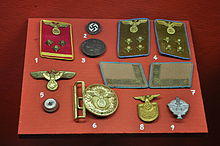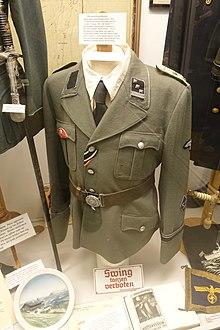

Nazi memorabilia are items produced during the height of Nazism in Germany, particularly the years 1933 to 1945. Nazi memorabilia includes attachments featuring the Flag of Nazi Germany, items with Nazi symbolism such as SS-Ehrendolch, Nazi medals, and contemporary editions of Adolf Hitler's Mein Kampf. During World War II, soldiers from opposing Allied forces often took small items from fallen enemies as war trophies. These and other items from this time period have since been acquired by museums and individual collectors.
In recent years the market for buying and selling Nazi memorabilia has increased. As veterans pass away, some families have tried to get rid of their possessions. There are also those who don't want the Nazis to be forgotten thus they are pulling items out of hiding. With the growing demands for Nazi memorabilia, many Jewish groups are disapproving the sale and purchase of Nazi products for leisure purposes. While others such as Haim Gertner, director of Israel's Holocaust memorial, believe that some of the Nazi memorabilia are worth saving, claiming that anti-Semitic history shouldn't be forgotten.[1]
Legal restrictions
The sale of Nazi memorabilia is strictly prohibited in parts of Europe. In France, the Internet portal site Yahoo! was sued in the case LICRA v. Yahoo! (2000) by the Union of Jewish Students and the International League against Racism and Anti-Semitism for "justifying war crimes and crimes against humanity" by allowing such memorabilia to be sold via its auction pages.[2] Yahoo!'s response was to ban the sale of Nazi memorabilia through its website. A Paris court cleared Yahoo! in 2003.
Fearing similar litigation, auction website eBay enacted new guidelines regarding the sale of Nazi memorabilia in 2003. eBay's policies prohibit items relating to Nazi media propaganda, items made after 1933 that contains a swastika, Nazi reproduction items such as uniforms, and all Holocaust-related products. Memorabilia such as coins, stamps, or printed period literature such as magazines, books, or pamphlets are not prohibited.[3]
See also
References
- ^ "Bottom line: is it immoral to sell Adolf Hitler's underpants?". South China Morning Post. 2018-12-28. Retrieved 2019-11-22.
- ^ "Yahoo! Inc., a Delaware Corporation, Plaintiff-appellee, v. La Ligue Contre Le Racisme et L'antisemitisme, a French Association; L'union Des Etudiants Juifs De France, a French Association, Defendants-appellants, 433 F.3d 1199 (9th Cir. 2006)". Justia Law. Retrieved 2019-11-25.
- ^ "Offensive material policy". Archived from the original on 2018-03-16. Retrieved 2019-11-20.
External links
- Suzie Thomas, Oula Seitsonen, Vesa-Pekka Herva Nazi memorabilia, dark heritage and treasure hunting as “alternative” tourism: understanding the fascination with the material remains of World War II in Northern Finland Lapland's Dark Heritage Project, University of Helsinki, Finland
- BBC article
- Hate or History?